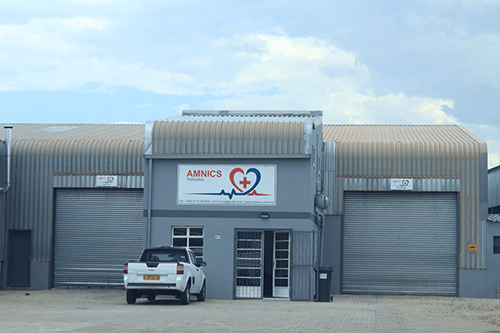Health tender magnate Shapwa Kanyama has refused this newspaper entry into his purported condom manufacturing factory, located in the Windhoek northern industrial area, citing privacy.
New Era’s Monday visit to the factory was to ascertain if indeed Kanyama at all owns a condom manufacturing plant, or if it merely exists on paper.
It follows last week’s shocking revelation by the Central Procurement Board of Namibia (CPBN) that it cannot say with certainty that
a factory exists. This is despite the board’s decision to award a medical supplies tender, worth around N$650 million, to Kanyama’s company – Amnics Trading, because it presented itself as a local manufacturer. However, industry players have disputed the life of Kanyama’s factory and its purported 50 employees.
According to news reports, Amnics Trading has just three employees registered with the Social Security Commission, something strange for a factory that, according to the businessman, “also exports” to other countries.
When the New Era crew arrived at the complex, which houses Amnic Trading’s warehouse or factory, there were two individuals, who appeared to be employees or caretakers.
A female employee had a laptop on the desk, while a casually dressed man was simply going through his phone.
It was evident that it was a laidback day at the office – if at all work takes place.
Shortly after the team identified itself by showing official media accreditation cards, the woman immediately started packing her bags, saying: “I was actually on my way to NamRA [Namibia Revenue Agency] to submit some papers”.
The New Era team requested to view the production site of the factory.
“I cannot allow you to go in. The director will be back at the end of the month. Maybe you can come then. I can also not tell you the name of the director. I am sorry,” she said.
Pressed if at all there was a factory or production taking place, she replied: “Yes. It’s a big factory – or let me say it’s a plant”.
Shortly thereafter, this publication called Kanyama to request entry into Amnic’s factory.
This request also hit a brick wall.
“My factory will not be visited. If you want to visit my factory, get a court order. Why must you visit my factory?” a clearly irate Kanyama asked.
He then pulled the race card, seemingly suggesting that he is facing greater scrutiny based on the colour of his skin.
“When a white man says ‘there is a factory’, do you guys go out and visit them?” he asked.
He then directed all questions regarding the factory to the trade ministry that issued him with a fitness certificate.
“Do you want to tell me that if a doctor gives you sick leave, you will question the sick leave that ‘was it really from a doctor’? Is it because I am a black man that you guys are doing this?” the flamboyant businessman continued questioning.
A certificate of registration of a factory was issued to Amnics Trading on 20 July 2022, less than three months after the tender was advertised.
The labour ministry this week confirmed it issued a certificate of registration of a factory to Amnics Trading (Pty) Ltd on 20 July 2022.
“The certificate is issued in terms of the regulations relating to the health and safety of employees at the workplace. In addition, an inspection was done at the factory, and the findings were that it (factory) met the occupational health and safety requirements, hence the issuance of the certificate,” said Maria Hedimbi, the ministry’s spokesperson.
The condom factory is situated on Birmingham Street in Windhoek’s northern industrial area.
“This is to certify that the above premises have on this day [20 June 2022] been registered as a factory under the Labour Act of 2007 for the manufacturing of disposable hygiene and pharmaceutical goods,” reads a section of the certificate.
A certain Mr D Shinime inspected the factory. Additionally, Kanyama equated the factory to a house.
“Will you allow a hundred people to come [and] see if you really have a TV in your house if they ask? Now, everyone must step into my factory; that doesn’t add any value to open my doors to everyone,” he said dismissively.
He, however, maintained the factory is in operation, and it even exports products to other countries.
After it was explained to Kanyama that it was in the public’s interest that his factory doors be opened for scrutiny, as it involves millions of taxpayers’ money, he agreed to a meeting.
Due to his packed schedule, he agreed to allow our team’s visit “on Wednesday”.
On Wednesday, the silence from Kanyama was deafening.
His phone went unanswered, while detailed text messages were simply ignored. Health minister Kalumbi Shangula, while giving an update on the Covid-19 situation in Namibia yesterday, also touched on the controversial tender.
“There are 492 items on this tender, including gloves and condoms. Cancellation of this tender will paralyse the operations of the ministry, endanger public health and put
human life at great risk.
It is a matter of great concern that there are unfortunate and dangerous views being spread both in the traditional/mainstream and social media that the procurement, supply and availability of condoms as a public health intervention are not useful,” he observed.
Shangula said without critical HIV prevention and control measures, the epidemic could spiral out of control.
He emphasised that condoms are a highly effective and cost-effective prevention intervention.
“It costs less than a dollar to prevent HIV infection using a condom. It costs approximately N$300 000 to treat an HIV-positive client over an average lifespan,” he noted.
– emumbuu@nepc.com.na


